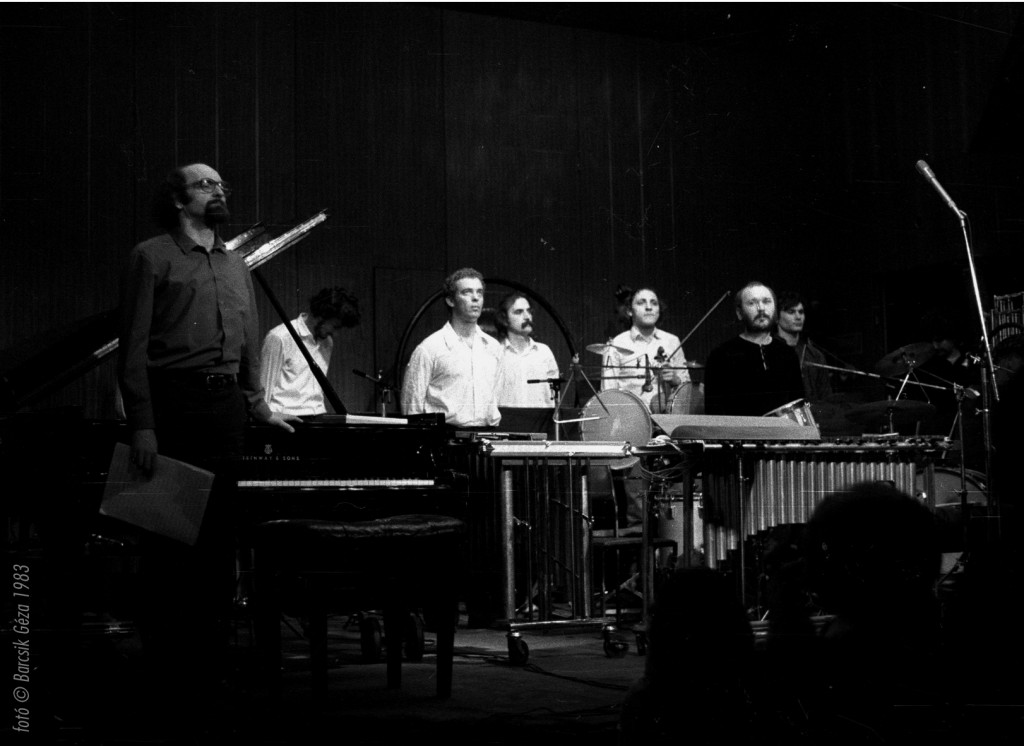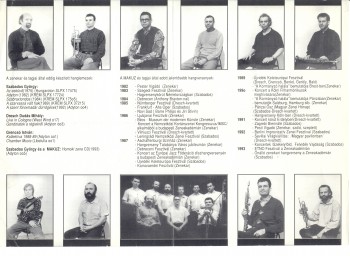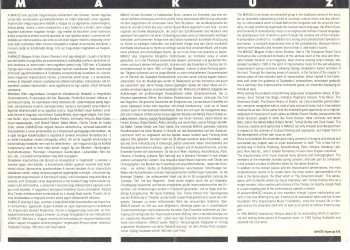Musicians
-
-
Szabados György (piano, prep. piano, conductor)
-
 Grencsó István
Grencsó István -
 Dresch Mihály
Dresch Mihály -
 Vaskó Zsolt
Vaskó Zsolt -
 Kovács Ferenc
Kovács Ferenc -
 Mákó Miklós
Mákó Miklós -
 Geröly Tamás
Geröly Tamás -
 Baló István
Baló István -
 Lőrinszky Attila
Lőrinszky Attila -
 Tréfás István
Tréfás István -
 Benkő Róbert
Benkő Róbert -
 “Kobzos” Kiss Tamás
“Kobzos” Kiss Tamás -
 Roscoe Mitchell
Roscoe Mitchell -
 Szelevényi Ákos
Szelevényi Ákos -
 Mezei Szilárd
Mezei Szilárd -
 Johannes Bauer
Johannes Bauer -
 Márkos Albert
Márkos Albert -
 Friedrich Károly
Friedrich Károly -
 Lajkó Félix
Lajkó Félix -
 Szokolay Balázs
Szokolay Balázs -
 Hock Ernő
Hock Ernő -
 Jávorka Ádám
Jávorka Ádám -
 Damir Bačikin
Damir Bačikin -
 Csuhaj Barna Tibor
Csuhaj Barna Tibor -
 Ervin Malina
Ervin Malina -
 Molnár Viktor
Molnár Viktor -
 Vigh András
Vigh András -
 Juhász Endre
Juhász Endre -
 Lazar Čolović
Lazar Čolović -
 Ittzés Gergely
Ittzés Gergely -
 Borbély Mihály
Borbély Mihály
-
performed compositions
-
 Adyton
Adyton -
 Baltás zsoltár (Axe Psalm)
Baltás zsoltár (Axe Psalm) -
 Regölés (Winter folk ritual)
Regölés (Winter folk ritual) -
 Előjátékok (Prelude)
Előjátékok (Prelude) -
 Beavatás (Initiation)
Beavatás (Initiation) -
 Bú-tup (Heart-Beat)
Bú-tup (Heart-Beat) -
 Motív (Motif)
Motív (Motif) -
 Hajnalok (Daybreaks)
Hajnalok (Daybreaks) -
 Istenek a Hortobágyon (Gods on the Hortobágy)
Istenek a Hortobágyon (Gods on the Hortobágy) -
 Mákvirágok [Homage a Stravinsky] (Poppies) [Homage to Stravinsky]
Mákvirágok [Homage a Stravinsky] (Poppies) [Homage to Stravinsky] -
 Délibáb [Homage a Lutoslawsky] (Fata Morgana) [Homage to Lutoslawski]
Délibáb [Homage a Lutoslawsky] (Fata Morgana) [Homage to Lutoslawski] -
 Legelő lovak [Homage a Kurosawa] (Grazing Horses) [Homage to Kurosawa]
Legelő lovak [Homage a Kurosawa] (Grazing Horses) [Homage to Kurosawa] -
 Halott madár [Homage a Sosztakovics] (Dead Bird) [Homage to Shostakovich]
Halott madár [Homage a Sosztakovics] (Dead Bird) [Homage to Shostakovich] -
 Holtág [Homage a Bartók] (Oxbow lake) [Homage to Bartók]
Holtág [Homage a Bartók] (Oxbow lake) [Homage to Bartók] -
 Ég [Homage a Hamvas] (Sky) [Homage to Hamvas]
Ég [Homage a Hamvas] (Sky) [Homage to Hamvas] -
 Lassú (Büszke magány) (Slow dance) (Proud solitude))
Lassú (Büszke magány) (Slow dance) (Proud solitude)) -
 Kormányzó halála (The death of the Emporor)
Kormányzó halála (The death of the Emporor) -
 Szertartászene királyunk, a Nap tiszteletére (Ceremony music in honour of our King, the Sun)
Szertartászene királyunk, a Nap tiszteletére (Ceremony music in honour of our King, the Sun) -
 Toj-toj (Toi toi toi)
Toj-toj (Toi toi toi)
Official Releases
LP / CD
Recording
Compositions
Musicians
Release Date: 1991
Recording Date: 10-12 September 1991
Recorded at: Szombathely Modern Gallery, Szombathely, Hungary
1. Hajnalok (Daybreaks) 9:43
2. Istenek a Hortobágyon (Gods on the Hortobágy) 16:38
3. Mákvirágok [Homage a Stravinsky] (Poppies) [Homage to Stravinsky] 7:09
4. Délibáb [Homage a Lutoslawsky] (Fata Morgana) [Homage to Lutoslawski] 8:51
5. Legelő lovak [Homage a Kurosawa] (Grazing Horses) [Homage to Kurosawa] 5:43
6. Halott madár [Homage a Sosztakovics] (Dead Bird) [Homage to Shostakovich] 5:57
7. Holtág [Homage a Bartók] (Oxbow lake) [Homage to Bartók] 10:04
8. Ég [Homage a Hamvas] (Sky) [Homage to Hamvas] 10:42
Szabados György (leader, piano)
Benkő Róbert (cello, double bass)
Dresch Dudás Mihály (soprano saxophone, bass clarinet, blockflute)
Geröly Tamás (percussion)
Grencsó István (alto saxophone)
Kovács Ferenc (trumpet, violin)
Lőrinszky Attila (double bass)
Mákó Miklós (trumpet)
Vaskó Zsolt (piccolo, blockflute, soprano saxophone, jew’s harp, flute)
Release Date: 1998
Concert Recording Date: 7. Oktober 1996
Recorded live at: Thalia Theater, Budapest
MAKUZ with Roscoe Mitchell
Roscoe Mitchell (as)
György Szabados (piano, chanting, leader)
Mihály “Dudás” Dresch (ts, ss, b-cl)
Ferenc Kovács (tp, violin)
Róbert Benkő (conta bass)
István Baló (dr, perc.)
Tamás Geröly (dr, perc.)
Release Date: 2007
Recording Date: 8. September 2007
Recorded at: Budapest Autumn Festival, Mu Theater – GyörFree Workshop Festival
1. Előjátékok (Prelude) 24:20
2. Lassú (Büszke magány) (Slow dance (Proud solitude)) 10:51
3. Baltás zsoltár (Axe Psalm) 23:49
4. Regölés (Winter folk ritual) 15:46
5. Part 5 3:38
Szabados György (piano, leader)
Grencsó István (saxophones, flute)
Vaskó Zsolt (saxophones, flute)
Szelevényi Ákos (saxophones)
Kovács Ferenc (trumpet, violin)
Mezei Szilárd (viola)
Márkos Albert (cello)
Ervin Malina (double bass)
Baló István (drums)
Geröly Tamás (drums)
known live performances: 1990 – 2009
Performance Date
Location
Musicians
Recording
1990, 3 Jan.
at the Philharmonie in Cologne (DE)
Musicians perhaps:
Gyorgy Szabados (piano)
Grencsó István (sax, flute,clarinet)
Dresch Mihály (sax, flute, bass clarinet)
Vaskó Zsolt (flute, piccolo)
Kovács Ferenc (trumpet)
Mákó Miklós (trumpet)
Benkő Róbert (bass)
Lőrinszky Attila (bass)
Geröly Tamás (percussion)
Baló István (percussion)
1990, 30 May
1990, 31 May
1990, 01 June
at Rode Zaal, Singelploeg in Antwerp(B), performance of Dance Opera – Musical Drama – “A kormányzó halála (The Governor’s Death/ La mort de l’empereur)”
Musicians:
Gyorgy Szabados (piano)
Grencsó István (sax, flute,clarinet)
Dresch Mihály (sax, flute, bass clarinet)
Vaskó Zsolt (flute, piccolo)
Kovács Ferenc (trumpet)
Mákó Miklós (trumpet)
Tréfás István (violin)
Benkő Róbert (bass)
Lőrinszky Attila (bass)
Geröly Tamás (percussion)
Baló István (percussion)
1990, June
in Salzburg (A), performance of Dance Opera – Musical Drama – “A kormányzó halála (The Governor’s Death/ La mort de l’empereur)”
Gyorgy Szabados (piano)
Tamás Kiss “Kobzos” (vocals)
Grencsó István (sax, flute,clarinet)
Dresch Mihály (sax, flute, bass clarinet)
Vaskó Zsolt (flute, piccolo)
Kovács Ferenc (trumpet)
Mákó Miklós (trumpet)
Tréfás István (violin)
Benkő Róbert (bass)
Lőrinszky Attila (bass)
Geröly Tamás (percussion)
Baló István (percussion)
1990, June
in Lievin (F), performance of Dance Opera – Musical Drama – “A kormányzó halála (The Governor’s Death/ La mort de l’empereur)”
Gyorgy Szabados (piano)
Tamás Kiss “Kobzos” (vocals)
Grencsó István (sax, flute,clarinet)
Dresch Mihály (sax, flute, bass clarinet)
Vaskó Zsolt (flute, piccolo)
Kovács Ferenc (trumpet)
Mákó Miklós (trumpet)
Tréfás István (violin)
Benkő Róbert (bass)
Lőrinszky Attila (bass)
Geröly Tamás (percussion)
Baló István (percussion)
between 1990, 12 – 17 June
at Theatre de la Ville, in Paris (F), performance of Dance Opera – Musical Drama – “A kormányzó halála (The Governor’s Death/ La mort de l’empereur)”
Gyorgy Szabados (piano)
Tamás Kiss “Kobzos” (vocals)
Grencsó István (sax, flute,clarinet)
Dresch Mihály (sax, flute, bass clarinet)
Vaskó Zsolt (flute, piccolo)
Kovács Ferenc (trumpet)
Mákó Miklós (trumpet)
Tréfás István (violin)
Benkő Róbert (bass)
Lőrinszky Attila (bass)
Geröly Tamás (percussion)
Baló István (percussion)
1990, 4 Aug.
in Hamburg (D), performance of Dance Opera – Musical Drama – “A kormányzó halála (The Governor’s Death/ La mort de l’empereur)”
Gyorgy Szabados (piano)
Tamás Kiss “Kobzos” (vocals)
Grencsó István (sax, flute,clarinet)
Dresch Mihály (sax, flute, bass clarinet)
Vaskó Zsolt (flute, piccolo)
Kovács Ferenc (trumpet)
Mákó Miklós (trumpet)
Tréfás István (violin)
Benkő Róbert (bass)
Lőrinszky Attila (bass)
Geröly Tamás (percussion)
Baló István (percussion)
1991, Spring
at Ifjúsági Ház, Szeged (HU)
Musicians:
Szabados György (leader, piano, vocal-recital)
Dresch Dudás Mihály (woodwinds)
Grencsó István (woodwinds)
perhaps Máko Miklós (trumpet)
perhaps Benkő Róbert (double bass)
Geröly Tamás (dr, percussion)
1991, 17 Oct.
at Kossuth Lajos University, Assembly Hall, Debrecen (HU)
Musicians:
Szabados György (leader, piano)
Dresch Dudás Mihály (flute, bass clarinet, ts)
Grencsó István (flute, alto clarinet, as)
Kovács Ferenc (trumpet, violin)
Benkő Róbert (double bass)
Geröly Tamás (dr, percussion)
1991, 5 Nov.
at Veszprémi Egyetem, Aula, Veszprém (HU)
Musicians:
Szabados György (leader, piano)
Dresch Dudás Mihály (flute, bass clarinet, ts)
Grencsó István (flute, alto clarinet, as)
other musicians not known
1991, 16 Nov.
at Vigadó Concert Hall, Budapest (HU)
Szabados György (conducter, piano)
„Kobzos” Kiss Tamás (vocal -Track#3)
Dresch Mihály (reeds)
Grencsó István (reeds)
Mákó Miklós (trumpet, tuba)
Kovács Ferenc (trumpet, violin)
Benkő Róbert (double bass, cello)
Geröly Tamás (drums, percussion)
1992, 12 May
Concert with MAKUZ in the Óbudai Társas Kör in Budapest (HU) – A contribution to the remembrance program of the poet József Bakucz
Szabados György (conducter, piano)
other Musicians unknown
1992, 23 May
Concert with MAKUZ in the Zeneakadémia in Budapest (HU)
Szabados György (conducter, piano)
other Musicians unknown
1992, 30 May
Concert with MAKUZ at the II. national music festival, in Budapest, Almássy téri szabadidő központ
Szabados György (conducter, piano)
other Musicians unknown
1992, 11 July
at Piarista Templom, Veszprém (HU)
Szabados György (conducter, piano)
other Musicians unknown
1992, 26 Dec.
Jazz Christmas in the Cserepes ház (Bp.XIV.Vezér u. 28/b.), Budapest (HU)
Musicians:
György Szabados (piano, leader)
Mihály Dresch (woodwinds)
Ferenc Kovács (violin)
Miklós Mákó (trumpet)
István Baló (drums)
Tamás Geröly (drums, percussion)
Zsolt Vaskó (woodwinds)
Róbert Benkő (double bass)
Félix Lajkó (violin)
further:
Éva Kanalas (vocal), Géza Fábri (kobza)
1993, 01 Apr.
at Academy of Music, Budapest (HU)
Musicians:
Szabados György (leader, piano)
Dresch Dudás Mihály (flute, sopran saxophone, bass clarinet, pipe)
Grencsó István (flute, alto saxophone)
Vaskó Zsolt (flute, soprano saxophone, pipe, jew’s harp)
Mákó Miklós (trumpet, fluegelhorn)
Kovács Ferenc (trumpet)
Friedrich Károly (trombone)
Lajkó Félix (violin)
Benkő Róbert (double bass)
Baló István (drums)
Geröly Tamás (drums, percussion)
1993, 10 Oct.
at Szeged Jazz Days, Szeged (HU)
Musicians:
unknown but perhaps:
Szabados György (leader, piano)
Benkő Róbert (cello, double bass)
Dresch Dudás Mihály (soprano saxophone, bass clarinet, blockflute)
Geröly Tamás (percussion)
Grencsó István (alto saxophone)
Kovács Ferenc (trumpet, violin)
Lőrinszky Attila (double bass)
Mákó Miklós (trumpet)
Vaskó Zsolt (piccolo, blockflute, soprano saxophone, jew’s harp, flute)
1994, 25 Oct.
in the Nagykanizsa Hevesi Sándor Művelődési Központ in Nagykanizsa (HU)
Musicians:
Szabados György (leader, piano)
other musicians unknown
1994, Dec.
at Petöfi Hall, Budapest (HU)
Musicians:
Szabados György (piano)
Benkő Róbert (double bass)
Dresch Dudás Mihály (soprano saxophone, bass clarinet, pipe)
Geröly Tamás (percussion)
Baló István (drums)
Kovács Ferenc (trumpet, violin)
Mákó Miklós (trumpet)
Vaskó Zsolt (pipe, soprano saxophone)
1995, 11 June
at the Budapest Budai parkszínpad, 3. Womufe (World music festival), Budapest (HU)
Musicians:
Szabados György (leader, piano)
other musicians unknown
1995, 15 Sept.
at Magyarkanizsa Jazz Festival
Musicians:
Szabados György (leader, piano)
Johannes Bauer (trombone)
Dresch Dudás Mihály (reeds)
Vaskó Zsolt (reeds)
Mákó Miklós (trumpet)
Kovács Ferenc (trumpet, violin)
Benkő Róbert (double bass)
Geröly Tamás (drums, percussion)
Baló István (drums, percussion)
1995, 17 Sept.
at ELTE Jogi Kar Dísztereme in Budapest (HU)
Musicians:
Szabados György (leader, piano)
Johannes Bauer (trombone)
Dresch Dudás Mihály (reeds)
Grencsó István (reeds)
Vaskó Zsolt (reeds)
Lajkó Félix (violin)
Mákó Miklós (trumpet)
Kovács Ferenc (trumpet, violin)
Benkő Róbert (double bass)
Geröly Tamás (drums, percussion)
Baló István (drums, percussion)
1996, 12 July
at the 25th Debrecen Jazz Days
MAKUZ (8 Musicians):
György Szabados (piano)
Dresch Dudás Mihály (reeds)
Grencsó István (reeds)
other Musicians unknown
1996, 7 Oct.
at Thalia Theatre, Budapest for CD: György Szabados/Roscoe Mitchell: Jelenés (Revelation) – Fonó Records FA-038-2
Roscoe Mitchell (as)
György Szabados (piano, chanting, leader)
Mihály “Dudás” Dresch (ts, ss, b-cl)
Ferenc Kovács (tp, violin)
Róbert Benkő (conta bass)
István Baló (dr, perc.)
Tamás Geröly (dr, perc.)
1996, 27 Dec.
Christmas concert at Fonó Buda Music House, Budapest (HU)
Szabados György (leader, piano)
the names of the other musicians are not known
1997, 31 May
Performance of György Szabados and MAKUZ with Jovica Fitzgerald: Hommage to the spirit of ancient blacks (Tisztelet a régi feketék szellemének), in the Fonó Budái Zeneház, Budapest (HU)
Szabados György (leader, piano)
Jovica Fitzgerald (vocal)
the names of the other musicians are not known
1998, 26 June
at Fonó Buda Music House, Budapest (HU)
Szabados György (leader, piano, voice)
Dresch Mihály (soprano saxophone, bass clarinet)
Vaskó Zsolt (soprano saxophone, jew’s-harp, piccolo, alto saxophone, flute)
Mákó Miklós (trumpet)
Kovács Ferenc (trumpet, fluegelhorn)
Benkő Róbert (double bass)
Baló István (drums)
Geröly Tamás (percussion)
1998, 26 Sept.
in the Fonó Budái Zeneház, Budapest (HU)
Szabados György (leader, piano)
the names of the other musicians are not known
1998, 28 Nov.
in the Fonó Budái Zeneház, Budapest (HU)
Szabados György (leader, piano)
the names of the other musicians are not known
1998, 27 Dec.
Christmas concert at Fonó Buda Music House, Budapest (HU)
Szabados György (leader, piano)
the names of the other musicians are not known
1999, 6 July
at the Hungarian radio, Marble Hall, Budapest (HU). 60th Birthday concert for Szabados.
Szabados György (leader, piano)
Dresch Mihály (soprano saxophone, bass clarinet, kaval)
Vaskó Zsolt (alto saxophone, soprano saxophone, jew’s harp, flute)
Mákó Miklós (trumpet)
Kovács Ferenc (trumpet, violin)
Benkő Róbert (double bass)
Baló István (drums)
Geröly Tamás (percussion)
1999, Nov.
recorded with MAKUZ at the Fonó Budai Zeneház in Budapest for movie-film-fiction (játékfilm)
György Szabados (piano)
Dresch Mihály (reeds)
Vaskó Zsolt (reeds)
Mákó Miklós (trumpet)
Kovács Ferenc (violin, zither)
Benkő Róbert (double bass)
Baló István (drums)
Geröly Tamás (percussion)
1999, 27 Dec.
Christmas concert at Fonó Buda Music House, Budapest (HU)
Szabados György (leader, piano)
the names of the other musicians are not known
2001, 27 Dec.
probably concert with MAKUZ at Fonó Budai Zeneház, Budapest (HU) – Kassák Christmas (Kassák Karácsony)
György Szabados (piano)
other members unknown
2002
recorded with MAKUZ for movie-film-fiction
György Szabados (piano)
other musicians unknown
2003, 28 Sept.
at the Debrecener Jazz Days 2003
Szabados György (leader, piano)
Grencsó István (flute, tenor saxophone, soprano saxophone)
Borbély Mihály (alto saxophone, tárogató, furulya)
Vaskó Zsolt (alto saxophone, piccolo, furulya)
Mákó Miklós (trumpet)
Johannes Bauer (trombone)
Kovács Ferenc (trumpet, violin)
Mezei Szilárd (viola)
Márkos Albert (cello)
Benkő Róbert (double bass)
Baló István (drums)
Geröly Tamás (percussion)
2003, 27 Dec.
at Fonó Budai Zeneház, Budapest (HU) – Kassák Christmas (Kassák Karácsony)
György Szabados (piano)
other members unknown
2004, 02 Oct.
at FONO Music House, Budapest (HU)
Szabados György (piano)
Szokolay Balázs (ss, fl)
Vaskó Zsolt (as, fl., Jew’s harp)
Grencsó István (ts)
Mákó Miklós (tp)
Mezei Szilárd (viola)
Benkő Róbert (double bass)
Geröly Tamás (perc.)
2004, 27 Dec.
at FONÓ Budai Zeneház (FONÓ Music House), Budapest (HU) – Kassák Karácsony (Kassák Christmas)
Szabados György (piano, leader)
Baló István (drums)
Geröly Tamás (percussion)
Benkő Róbert (double bass)
Grencsó István (tenor sax.)
Borbély Mihály (alto sax., tárogató)
Vaskó Zsolt (ss, piccolo, jew’s-harp)
Szokolay „Dongó” Balázs (ss, furulya)
Mákó Miklós (trumpet)
Mezei Szilárd (viola)
Márkos Albert (cello)
2005, 6 Sept.
at Jugoslav Dramens Theatre in Belgrade.
Performance of the composition: “Szertartászene királyunk, a Nap tiszteletére (Ceremony music in honour of our King, the Sun)”
1st performance of the newly rewritten composition: “Szertartászene királyunk, a Nap tiszteletére (Ceremony music in honour of our King, the Sun)” (34 man orchestra) world premiere.
György Szabados with “MAKUZ” & “Members of the Chamber Orchestra <Liszt Ferenc>, Budapest”, plus “Choir of six bass”
MAKUZ:
Szabados György (conductor/preparated piano)
Kobzos Kiss Tamás (vocal, hurdy-gurdy)
Szelevényi Ákos /F/ (reeds)
Borbely Mihály /H/ (reeds)
Grencsó István /H/ (reeds)
Vaskó Zsolt /H/ (reeds)
Mákó Mikló /H/ (trumpet)
Kovács Ferenc /H/(trumpet, violina)
Damir Bacikin /SCG/ (trumpet)
Vigh András /NL/ (tekere/hurdy-gurdy)
Juhász Endre /H/ (oboe)
Ittzés Gergely /H/ (bass flute)
Mezei Szilárd /SCG/ (viola)
Jávorka Ádám /H/ (viola)
Márkus Albert /R/ (violoncello)
Molnár Viktor /SCG/ (violoncello)
Benkő Róbert (contrabass)
Ervin Malina /SCG/ (contrabass)
Csuhaj Barna Tibor /H/ (contrabass)
Hock Ernő /H/(contrabass)
Lazar Colović /SCG/ (vibrafon)
Geröly Tamás /H/ (drums, percussion)
Baló István /H/ (drums, percussion)
Choir of six bass: /SCG/
Popović Nebojša (bass)
Vujović Milijan (bass)
Petrović Aleksandar (bass)
Krneta Goran (bass)
Zarić Miloš (bass)
Golubović Petar (bass)
Members of the Chamber Orchestra «Liszt Ferenc», Budapest:
Horváth Róbert (violin)
Hamar Péter (violin)
Pintér Attila (violin)
Tfirst Peter (violin)
Hutás Gergely (violin)
2005, 7 Sept.
Performance of the composition: “Szertartászene királyunk, a Nap tiszteletére (Ceremony music in honour of our King, the Sun)”
2nd performance of the newly rewritten composition: “Szertartászene királyunk, a Nap tiszteletére (Ceremony music in honour of our King, the Sun)” at Magyarkanizsa Jazz Festival, Art House, Kaniza.
György Szabados with “MAKUZ” & “Members of the Chamber Orchestra <Liszt Ferenc>, Budapest”, plus “Choir of six bass”
MAKUZ:
Szabados György (conductor/preparated piano)
Kobzos Kiss Tamás (vocal, hurdy-gurdy)
Szelevényi Ákos /F/ (reeds)
Borbely Mihály /H/ (reeds)
Grencsó István /H/ (reeds)
Vaskó Zsolt /H/ (reeds)
Mákó Mikló /H/ (trumpet)
Kovács Ferenc /H/(trumpet, violina)
Damir Bacikin /SCG/ (trumpet)
Vigh András /NL/ (tekere/hurdy-gurdy)
Juhász Endre /H/ (oboe)
Ittzés Gergely /H/ (bass flute)
Mezei Szilárd /SCG/ (viola)
Jávorka Ádám /H/ (viola)
Márkus Albert /R/ (violoncello)
Molnár Viktor /SCG/ (violoncello)
Benkő Róbert (contrabass)
Ervin Malina /SCG/ (contrabass)
Csuhaj Barna Tibor /H/ (contrabass)
Hock Ernő /H/(contrabass)
Lazar Colović /SCG/ (vibrafon)
Geröly Tamás /H/ (drums, percussion)
Baló István /H/ (drums, percussion)
Choir of six bass: /SCG/
Popović Nebojša (bass)
Vujović Milijan (bass)
Petrović Aleksandar (bass)
Krneta Goran (bass)
Zarić Miloš (bass)
Golubović Petar (bass)
Members of the Chamber Orchestra «Liszt Ferenc», Budapest:
Horváth Róbert (violin)
Hamar Péter (violin)
Pintér Attila (violin)
Tfirst Peter (violin)
Hutás Gergely (violin)
2006, 27 Dec.
at Fonó Buda Music House, Budapest (HU)
György Szabados (p)
Jávorka Ádam (viola)
Grencsó István (tenor saxophone)
Vaskó Zsolt (alto saxophone, pipe, flute)
Baló István (drums)
Szelevényi Ákos (soprano saxophone, tenor saxophone)
Geröly Tamás (percussion)
Mákó Miklós (trumpet, flugelhorn)
Benkő Róbert (double bass)
2007, 8 Sept.
at MU Theater, Budapest – GyörFree Workshop Festiva. Concert released 2007 on “Győrfree Műhely Fesztivál a MU Színházban 2007/2” – GyörFREE Mühely 2007 – CD 2
Szabados György (piano, leader)
Grencsó István (saxophones, flute)
Vaskó Zsolt (saxophones, flute)
Szelevényi Ákos (saxophones)
Kovács Ferenc (trumpet, violin)
Mezei Szilárd (viola)
Márkos Albert (cello)
Ervin Malina (double bass)
Baló István (drums)
Geröly Tamás (drums)
2009, 16 Mar.
Palace of Arts – Festival Theatre, Budapest (HU)
Szabados György (piano)
Mákó Miklós (trumpet)
Kovács Ferenc (trumpet, violin)
Grencsó István (tenor saxophone)
Szelevényi Ákos (soprano and tenor saxophone, bass clarinet)
Dresch Mihály (soprano and tenor saxophone, bass clarinet, pipe)
Vaskó Zsolt (alto saxophone, piccolo, pipes, Jew’s harp)
Szilárd Mezei (viola)
Márkos Albert (cello)
Róbert Benkő (double bass)
Baló István (drums, percussion)
Geröly Tamás (drums, percussion)
2009, 05 Sept.
Debrecen Jazz Days, Debrecen (HU)
Szabados György (piano)
other members unknown



 A zenekarban az volt a gyakorlat, hogy ne csak egyedül vagy ketten, hanem akár tizenötös létszámban is tudjunk minden előzetes megkötöttség nélkül is improvizálni. Tudtam, hogy az ehhez szükséges magas szintű szellemi jelenlét és szakmai alkalmasság csak akkor érhető el, ha képesek leszünk magunkban és közösen, egyként felfogni sejtésünk géniuszát, aki bennünk és közöttünk mindent összerendez és összetart. De ez a kapcsolat nem jöhet létre, ha az ott muzsikáló zenészben nem támad fel, ha nem bontakoztatja ki az ember morálisan, lelkileg és szellemileg egyaránt ezt a géniuszt; ha nem “avatódik be”. Ha nem merül a “születés-előtti”-be, a tiszta és örök benső rendbe és annak autentikus hangi megszólaltatásába a zenész és a társaság. Ezek a gyakorlatok tizenöt-húsz éven keresztül folytak, amíg sikerült magunkat olyan tiszta és magabiztos állapotba hozni, amelyben a hiúság csírája sem volt megtalálható. Csak így hallható meg ugyanis magunkban az a bennünk születő és kikívánkozó hang és hangzás, amely (zenei) megnyilatkozásként hat, és rögvest vezérel, jelleget és arányokat, sőt formát teremt, szépséget, miközben magával ragad. Csak ekkor tudom átengedni teljesen magamat világosan, automatikusan, pontosan, összes képességemmel és erényeimmel, minden “akarat nélkül”, szinte már csak a jelenlét által, az Egész sugalmának, sugallatának, a születő zene csodájának. “Miként a Nap és a Hold sem tud visszatükröződni a zavaros vízben, azonképpen a Mindenható sem tud visszatükröződni egy olyan szívben, amely az »én« és az »enyém« ideájától zavaros.” Pontosan ugyanaz a helyzet egy zenekaron belül, mint ami a társadalom helyes szerveződésének a képlete. Nem véletlen, hogy Fellini is készített hasonló, bár inkább szatirikus céllal filmet egy zenekari próbáról. Ő éppen az ellentétét, a világ széthullását meséli el e látomásában, ironikusan, gyönyörűen, fájdalmasan. A Magyar Királyi Udvari Zenekarban (Baló István, Benkő Róbert, Dresch Dudás Mihály, Geröly Tamás, Grencsó István, Kobzos Kiss Tamás, Kovács Ferenc, Lőrinczky Attila, Makó Miklós, de korábban már Faragó Antal, Vajda Sándor, Kathy Horváth Lajos, Váczi Tamás, Tréfás István és Tarkó Magda is) a zene és a zenélés gyönyörűségén át azt próbáltuk meg, olykor igen küszködve, máskor önfeledten, szinte simán és boldogan, hogy hogyan lehet kibontani magunkban és magunkból egy jó, igaz és megnyugtató világot. Az épülés természetes és törvényszerű módját kerestük és gyakoroltuk, a zene éltető közegében, tehetségünk eszközeivel. Mindent csak ezen az alapon lenne szabad tenni és tanítani. Látván azt az “ikont” és érezvén azt a géniuszt, ami-aki küld, eligazít, véd és szeret – mindig mindent mélyen belülről, önmagunkon túlról indítani, ápolni és terelni, ez a rombolhatatlanság, ez a titok, ez a lényeg.
A zenekarban az volt a gyakorlat, hogy ne csak egyedül vagy ketten, hanem akár tizenötös létszámban is tudjunk minden előzetes megkötöttség nélkül is improvizálni. Tudtam, hogy az ehhez szükséges magas szintű szellemi jelenlét és szakmai alkalmasság csak akkor érhető el, ha képesek leszünk magunkban és közösen, egyként felfogni sejtésünk géniuszát, aki bennünk és közöttünk mindent összerendez és összetart. De ez a kapcsolat nem jöhet létre, ha az ott muzsikáló zenészben nem támad fel, ha nem bontakoztatja ki az ember morálisan, lelkileg és szellemileg egyaránt ezt a géniuszt; ha nem “avatódik be”. Ha nem merül a “születés-előtti”-be, a tiszta és örök benső rendbe és annak autentikus hangi megszólaltatásába a zenész és a társaság. Ezek a gyakorlatok tizenöt-húsz éven keresztül folytak, amíg sikerült magunkat olyan tiszta és magabiztos állapotba hozni, amelyben a hiúság csírája sem volt megtalálható. Csak így hallható meg ugyanis magunkban az a bennünk születő és kikívánkozó hang és hangzás, amely (zenei) megnyilatkozásként hat, és rögvest vezérel, jelleget és arányokat, sőt formát teremt, szépséget, miközben magával ragad. Csak ekkor tudom átengedni teljesen magamat világosan, automatikusan, pontosan, összes képességemmel és erényeimmel, minden “akarat nélkül”, szinte már csak a jelenlét által, az Egész sugalmának, sugallatának, a születő zene csodájának. “Miként a Nap és a Hold sem tud visszatükröződni a zavaros vízben, azonképpen a Mindenható sem tud visszatükröződni egy olyan szívben, amely az »én« és az »enyém« ideájától zavaros.” Pontosan ugyanaz a helyzet egy zenekaron belül, mint ami a társadalom helyes szerveződésének a képlete. Nem véletlen, hogy Fellini is készített hasonló, bár inkább szatirikus céllal filmet egy zenekari próbáról. Ő éppen az ellentétét, a világ széthullását meséli el e látomásában, ironikusan, gyönyörűen, fájdalmasan. A Magyar Királyi Udvari Zenekarban (Baló István, Benkő Róbert, Dresch Dudás Mihály, Geröly Tamás, Grencsó István, Kobzos Kiss Tamás, Kovács Ferenc, Lőrinczky Attila, Makó Miklós, de korábban már Faragó Antal, Vajda Sándor, Kathy Horváth Lajos, Váczi Tamás, Tréfás István és Tarkó Magda is) a zene és a zenélés gyönyörűségén át azt próbáltuk meg, olykor igen küszködve, máskor önfeledten, szinte simán és boldogan, hogy hogyan lehet kibontani magunkban és magunkból egy jó, igaz és megnyugtató világot. Az épülés természetes és törvényszerű módját kerestük és gyakoroltuk, a zene éltető közegében, tehetségünk eszközeivel. Mindent csak ezen az alapon lenne szabad tenni és tanítani. Látván azt az “ikont” és érezvén azt a géniuszt, ami-aki küld, eligazít, véd és szeret – mindig mindent mélyen belülről, önmagunkon túlról indítani, ápolni és terelni, ez a rombolhatatlanság, ez a titok, ez a lényeg.